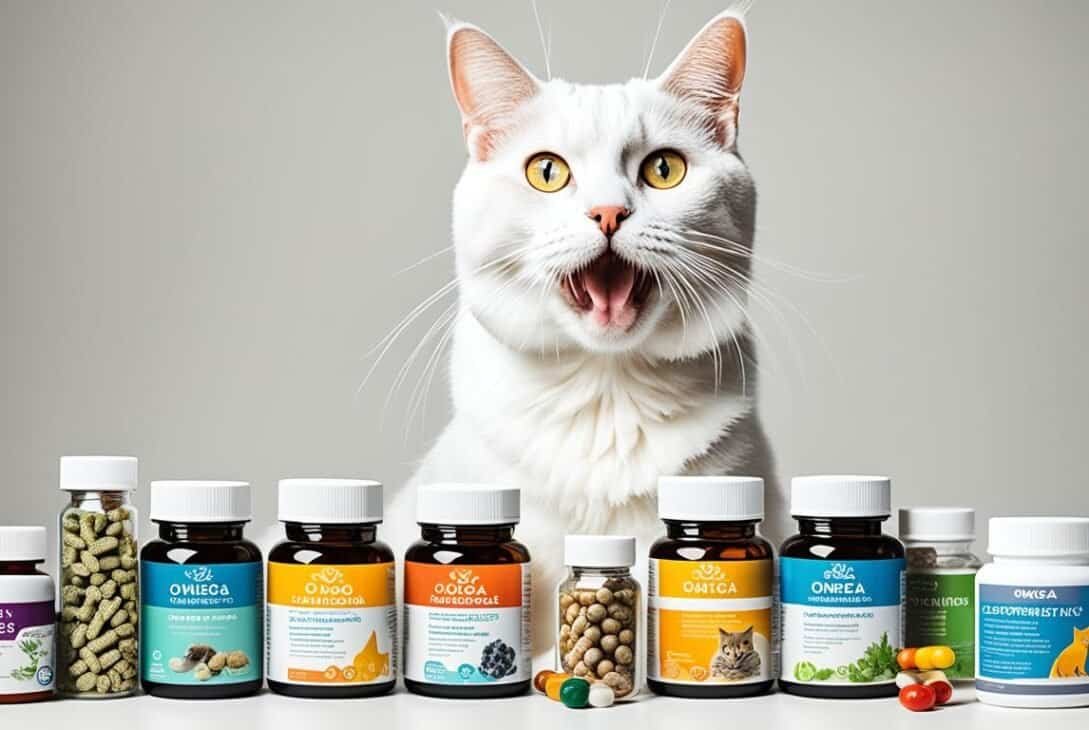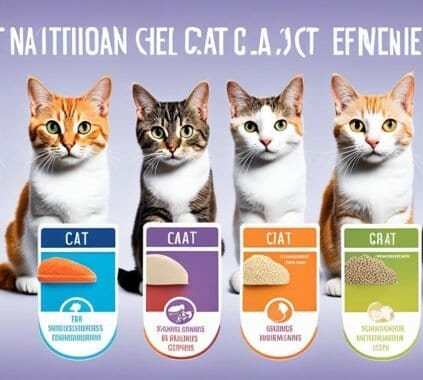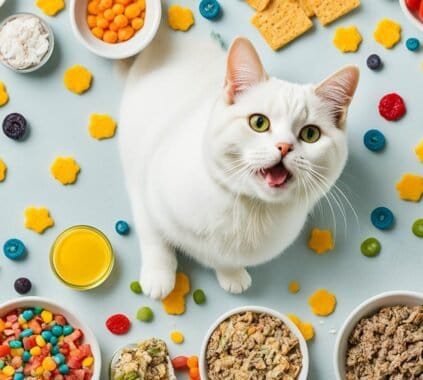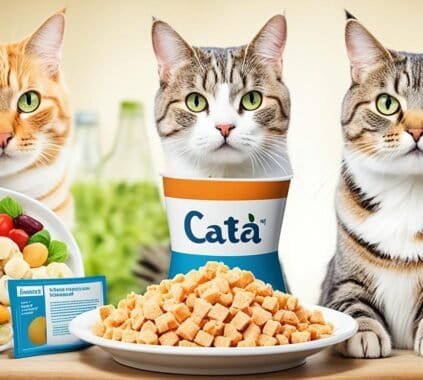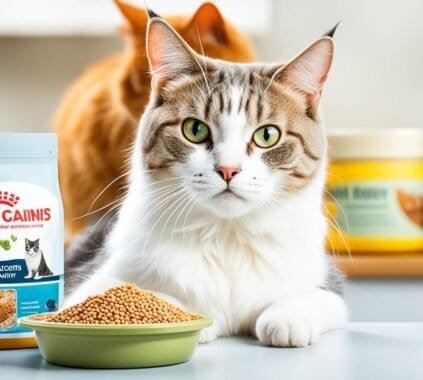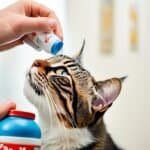Cat supplements are an important way to ensure the health and well-being of your feline companion. While a balanced diet is crucial, certain supplements can provide an extra boost of nutrients that support your cat’s overall health. In this article, we will explore the top-rated and vet-approved natural cat supplements that can help keep your cat healthy and thriving.
Key Takeaways:
- Choosing the best cat supplements can provide additional nutrients that support your cat’s health.
- A balanced diet is essential, but supplements can offer an extra boost and keep your cat thriving.
- Omega-3 fatty acids promote skin and coat health, reducing inflammation and supporting joint health.
- Probiotics help maintain a healthy digestive system and boost the immune system.
- Vitamin B complex ensures your cat gets enough nutrients for energy production, brain function, and healthy skin and coat.
Omega-3 Fatty Acids
Omega-3 fatty acids play a vital role in maintaining your cat’s skin and coat health. These essential nutrients not only keep the skin moisturized but also help reduce inflammation and promote healthy joints. Including omega-3 fatty acids in your cat’s diet can have numerous benefits for their overall well-being.
You can provide your cat with omega-3 fatty acids through fish oil supplements or by including natural food sources in their diet. Foods like salmon and tuna are rich in omega-3 fatty acids and can contribute to improving your cat’s skin and coat health.
Incorporating fish oil supplements into your cat’s routine can be convenient and effective. These supplements are designed to provide a concentrated dose of omega-3 fatty acids, ensuring your cat receives the necessary nutrients to support their skin and coat health.
By including omega-3 fatty acids in your cat’s diet, you can enhance their skin’s moisture, alleviate inflammation, and promote the health of their joints. Consider incorporating fish oil supplements or including omega-3 rich foods in your cat’s meals to support their overall well-being.
Probiotics
Probiotics are beneficial bacteria that play a crucial role in maintaining your cat’s digestive health and immune system. By introducing probiotic supplements into your cat’s diet, you can help restore and maintain the balance of healthy gut bacteria, which is important for their overall well-being.
These supplements are especially beneficial for cats suffering from digestive issues like diarrhea or constipation. Probiotics work by aiding in the breakdown and absorption of nutrients, promoting regular bowel movements, and supporting a healthy gut environment.
Having a healthy population of gut bacteria can improve your cat’s digestion and nutrient absorption, which in turn supports their energy levels and overall vitality. Additionally, probiotics can help strengthen their immune system, making them more resistant to common illnesses and infections.
When choosing probiotic supplements for your cat, look for those specifically formulated for feline health. These supplements should contain strains of bacteria that are beneficial for cats, such as Lactobacillus acidophilus and Bifidobacterium animalis. Always consult with your veterinarian before introducing any new supplements or making changes to your cat’s diet.
Remember, a healthy digestive system is essential for your cat’s overall well-being. By incorporating probiotic supplements into their daily routine, you can support their digestive health, promote a healthy gut environment, and ensure they are getting the most from their diet.
Vitamin B Complex
The B vitamins play a crucial role in maintaining your cat’s overall health and well-being. This complex of vitamins is involved in various functions in your cat’s body, including energy production, brain function, and the maintenance of a healthy skin and coat.
While many cat foods do contain some amount of B vitamins, it may not always be enough to meet your cat’s specific needs. Therefore, supplementing your cat’s diet with a B complex supplement can ensure they receive adequate amounts of each individual vitamin.
The B vitamins are particularly important for energy production in cats. They are involved in the metabolism of macronutrients, such as carbohydrates, proteins, and fats, which provide the necessary energy for your cat’s daily activities.
In addition to energy production, the B vitamins also support healthy skin and coat in cats. They play a vital role in maintaining the integrity of the skin, promoting cell growth and repair, and preventing skin conditions like dermatitis and dryness. A healthy skin and coat not only contributes to your cat’s overall appearance but also indicates their general well-being.
Some of the key B vitamins for cats include:
- Vitamin B1 (thiamine)
- Vitamin B2 (riboflavin)
- Vitamin B3 (niacin)
- Vitamin B5 (pantothenic acid)
- Vitamin B6 (pyridoxine)
- Vitamin B7 (biotin)
- Vitamin B9 (folic acid)
- Vitamin B12 (cobalamin)
Each of these B vitamins has its own specific functions and benefits for your cat’s health. By ensuring your cat has sufficient levels of these vitamins through a B complex supplement, you can support their energy levels, brain function, and achieve a healthy skin and coat.
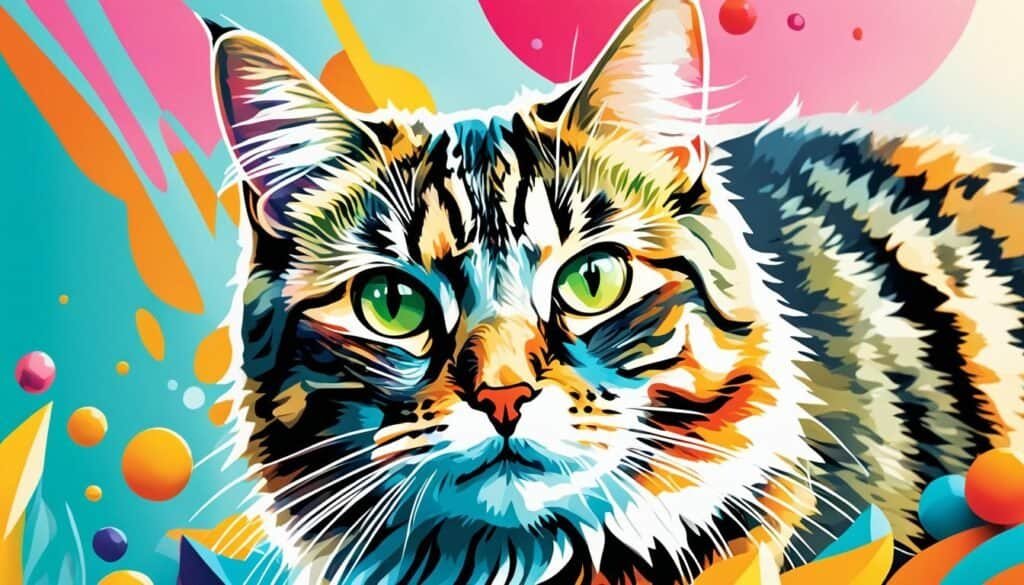
Choosing a Vitamin B Complex Supplement
When selecting a B complex supplement for your cat, it’s important to look for a high-quality product specifically formulated for feline use. Ensure that the supplement contains the right balance of all the essential B vitamins and follow the recommended dosage instructions provided by the manufacturer or your veterinarian.
Remember, supplements should never replace a balanced and nutritious diet for your cat. Always consult with your veterinarian before introducing any new supplements to your cat’s routine to ensure they are suitable for their individual needs.
Glucosamine and Chondroitin
Glucosamine and chondroitin supplements are essential for supporting joint health in older cats or those experiencing mobility issues. These nutrients play a vital role in promoting cartilage repair and ensuring proper lubrication of the joints. By incorporating glucosamine and chondroitin into your cat’s diet, you can help alleviate discomfort and improve their overall joint function.
These supplements can be easily found in the form of dedicated supplements or sourced naturally from foods like chicken feet and pig ears. Including glucosamine and chondroitin in your cat’s daily routine can contribute to their joint health and enhance their overall quality of life.
Considering the importance of joint health for cats, it’s crucial to provide them with the necessary support. Whether your cat is aging or facing mobility challenges, the use of glucosamine and chondroitin can make a significant difference in maintaining cartilage health and promoting joint function.

Milk Thistle and Other Cat Supplements
When it comes to supporting your cat’s overall health, there are various supplements that can make a difference. Milk thistle is one such supplement that plays a crucial role in liver health. By promoting detoxification and protecting liver cells, milk thistle ensures that your cat’s liver is functioning optimally.
Digestive enzymes are another important addition to your cat’s supplement regimen. These enzymes aid in the digestion and absorption of nutrients, ensuring that your cat gets the most out of their food. They can help alleviate digestive issues and promote a healthy digestive system in your furry friend.
For heart and eye health, taurine is an essential nutrient. Cats cannot produce taurine naturally, so it’s important to provide it through supplements. Taurine helps maintain the normal function of the heart and plays a vital role in vision, making it a key supplement for your cat’s overall well-being.
In addition to milk thistle, digestive enzymes, and taurine, there are other supplements that can further enhance your cat’s health. Coenzyme Q10 is an antioxidant that supports cell function, lysine helps with immune system function, and cranberry can aid in maintaining a healthy urinary tract. By incorporating these supplements into your cat’s diet, you can provide them with additional support for various aspects of their health.
FAQ
Are cat supplements necessary?
Which supplements are beneficial for the skin and coat?
How do probiotics benefit my cat?
Why should I consider a B vitamin supplement for my cat?
How can glucosamine and chondroitin supplements help my cat?
What health benefits do other cat supplements offer?
Last modified: February 26, 2024

